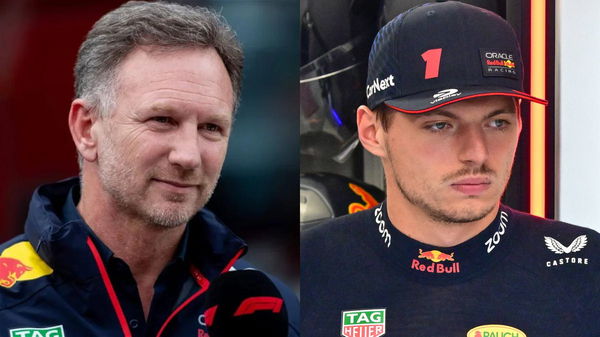
via Imago
Image Courtesy: Imago (L) Christian Horner- (R) Max Verstappen

via Imago
Image Courtesy: Imago (L) Christian Horner- (R) Max Verstappen
As Red Bull took home the Constructors’ Championship in 2023, Max Verstappen took the spotlight yet again. In the last 3 successive seasons, Verstappen has won the Drivers’ Championship and this season he did so in a record-breaking manner bagging wins in 19 out of the 22 races. While he is on an incredible streak, Christian Horner, the Principal of Red Bull Racing, believes that it is coming to an end.
Max Verstappen has been involved with Red Bull for almost all of his career. Starting in Scuderia Toro Rosso at the age of 17, today he is known as the reigning World Champion, and while he is a high-peak in his career, Horner believes in the economic law of diminishing returns which would end this streak. Why is that you ask?
ADVERTISEMENT
Article continues below this ad
Christian Horner’s belief of the beginning of the downfall of Red Bull
Red Bull’s dominant performance in 2023, securing a second consecutive Constructors’ title and a third consecutive Drivers’ Championship triumph with Max Verstappen, was exceptional. However, while Horner spoke to Formula 1, he said, “I’m fully expecting with stable regulations, [there’ll be] diminishing returns for us, because I think we got to the top of the curve quicker than others.”

via Reuters
Formula One F1 – Japanese Grand Prix – Suzuka Circuit, Suzuka, Japan – September 24, 2023 Red Bull’s Max Verstappen celebrates on the podium with team principal Christian Horner Red Bull after winning the Japanese Grand Prix and the constructors title REUTERS/Issei Kato
He acknowledges the difficulty of replicating such dominance due to the law of diminishing returns with stable regulations. The team reached the top of the development curve quickly, and Horner expects the field to converge. While further explaining, he stated, “I don’t think we’ll ever see a repeat, certainly not in our lifetimes, of what we managed to achieve [last] year with a car that’s managed the kind of dominance of RB19.”
Read More – After “Sh*tbox” Claim on Max Verstappen, Ex-Mercedes CEO Signals “Trouble” in Paradise for Toto Wolff & Co.
While it may seem that having the lead year after year would end up helping a team Snowball into greatness, F1 has some regulations that help balance the playing field. Due to Red Bull standing 1st in 2023, the team gets less Wind Tunnel time. This will mean that drivers must cope with the reduced technical advantage they had with the RB19.
Despite having fewer wind tunnel tests and CFD runs due to their success, Red Bull is focused on evolving their successful RB19 philosophy for the RB20. The challenge lies in adapting their development approach with limited resources. While Red Bull gets ready for the 2024 season, we say goodbye to the RB19 and look forward to seeing what the RB20 will achieve.
RB19: The deserving send-off
Red Bull Racing owes it to its driver and machine for reaching greatness in 2023, proving that Red Bull is the champion team for 3 years in a row. In the year that they took the RB19 for a spin, the team won 95.4% of the races. This dominance on the track translated into a remarkable level of success throughout the season.
ADVERTISEMENT
Article continues below this ad

via Reuters
Formula One F1 – British Grand Prix – Silverstone Circuit, Silverstone, Britain – July 9, 2023 Red Bull’s Max Verstappen celebrates with a trophy on the podium after winning the race REUTERS/Molly Darlington
Max Verstappen, the team’s lead driver, played a pivotal role in their success. He led over 75% of all laps during the 2023 season, showcasing his consistency and skill behind the wheel. Red Bull demonstrated excellence in pit stops, boasting the fastest pit stops, with an impressive average time of 2.5 seconds. Efficient pit stops are crucial in Formula 1 races, and Red Bull’s quick turnaround times contributed to their overall success.
Despite having competed in 400 fewer races than Williams, Red Bull moved within one victory of Williams in terms of Grand Prix victories. This achievement underscores Red Bull’s rapid ascent in the world of Formula 1 and its ability to compete at the highest level. With the RB20, the team looks forward to showcasing an “evolution rather than a revolution.” Meaning fans can look forward to seeing the same DNA as RB19, with enhancements taken on the tracks for Red Bull.
ADVERTISEMENT
Article continues below this ad
WATCH THIS STORY: Drive to Survive’s success becomes inspiration for F1 TV drama with Star Wars actress as the lead
That being said, do you think Red Bull will maintain its dominance in the upcoming season? Let us know in the comments section below.
ADVERTISEMENT
ADVERTISEMENT
ADVERTISEMENT
ADVERTISEMENT

